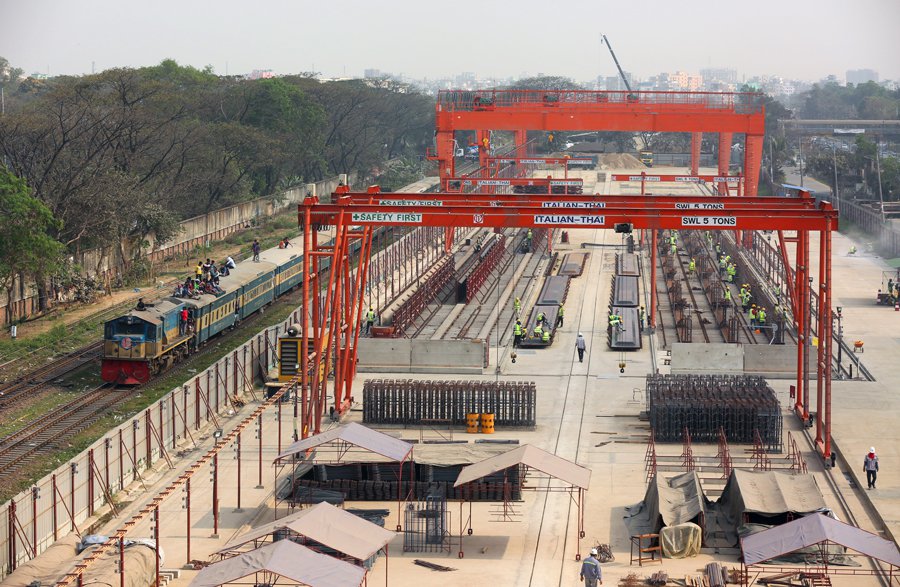Published in Dhaka Tribune on Monday, 26 February 2018
What happens when Bangladesh moves from LDC to developing country?
Golam Mowla

The new status will strengthen the country’s image and international standing, but will usher in a number of challenges
Over the last few years, anticipation that Bangladesh would become a developing country by 2021 has grown. On February 22, Home Minister Asaduzzaman Khan Kamal told reporters that a formal announcement would be made on March 20 about Bangladesh’s graduation into the developing country category.
Amid all this discussion on poor and middle-income countries, many are wondering what will happen when Bangladesh sheds its LDC status and becomes a developing nation.
There are three criteria a country must fulfil before graduating from low-income country status to developing country status. The first one is having a Gross National Income (GNI) per capita of $1,242. Bangladesh’s current per capita income is $1,610.
The second one is Human Assets Index (HAI), which has to be 66 or above. Bangladesh’s HAI is 72.9.
And the last one is having an Economic Vulnerability Index below 32. Bangladesh’s EVI is 25.
Having fulfilled all three criteria, the country now awaits a formal approval for inclusion in the list of developing countries. Bangladesh will formally become a developing country with the approval of United Nations Economic and Social Council.
The government considers the country’s promotion as a major achievement. A reception will be given to Prime Minister Sheikh Hasina on March 22. On that day, processions will be brought out throughout the country. This celebration will continue until March 26, Bangladesh’s Independence Day.
UN Resident Coordinator and UNDP Resident Representative in Bangladesh Mia Seppo has already congratulated the country for the achievement.
Atiur Rahman, the former central bank chairman, said the country’s inclusion in the list of developing nations is a matter of great pride.
“Our stature will rise once we make it into the developing country list. Bangladesh’s image will be brightened,” he said. “Nobody will be able to call Bangladesh poor anymore.”
Dr Khondaker Golam Moazzem, the research director at Centre for Policy Dialogue, said that getting out of the LDC list meant that nobody would be able to consider Bangladesh a weak nation.
“It is a matter of pride for any country. Once this feat is achieved, a sense of relief will be created in the country,” he added.
Moazzem noted that as a developing country, Bangladesh’s importance will increase in the international arena. The world considers the economic basis of developing nations as strong. This will help mitigate Bangladesh’s economic risks, meaning the risks taken into account while investing in private and public sectors will go down to some extent.
“This will help boost the chance of foreign investment while international agencies will be interested to give loans,” he noted.
Challenges for Bangladesh as a developing country
Economists say Bangladesh will have to face a number of challenges after shedding its LDC status. Failures to meet the challenges will give rise to fears that Bangladesh will lag behind. They say internal social and political problems have to be resolved. Any kind of political and social instability can undermine progress.
Moazzem cited several African countries that lagged behind due to social and regional problems despite being on the path of development.
He said: “There has to be more industrialization in Bangladesh. Both production and jobs have to be increased. For this, more industries have to be set up and internal resources have to be increased.”
Inclusive development, good governance, and dispelling social discrimination are important along with speeding up revenue collection and increasing GDP growth, he said.
The CPD director also mentioned the risks Bangladesh will face after becoming a developing country: “The interest rates on loans from various countries and international agencies will rise. Grace periods will be shortened or will be unavailable. The period for paying back loans will be reduced.
“These will push up foreign loan related costs. The export market will shrink to some extent. There could be risks, particularly with new products. For the old products, the cost for entering export market will rise. All sorts of duty facilities may end. New conditions may be added in the export market. Foreign funds for NGO will go down; the funding will stop.”
Ways forward
Atiur Rahman said that although the announcement would come in March, Bangladesh needs to complete a number of tasks by 2028.
“We have to improve our human resources within these nine or ten years,” he said. “We need to amend our policies to survive in the global market and we have to be ready to do so.”
The former central bank governor continued: “Coordination has to be increased with various countries and international organizations. Our policymakers have to gain maturity for that. Competence in negotiation with other countries has to be achieved.
“We also have to be alert to sure that no economic [or political] instability hits the country in the coming years.”
Meanwhile, Bangladesh will continue to enjoy the facilities it has been getting as a LDC until 2027 after becoming a developing country.
This article was first published on banglatribune.com


